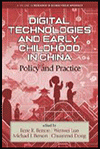
Digital Technologies and Early Childhood in China
Policy and Practice
Edited by:
Ilene R. Berson, University of South Florida
Wenwei Luo, Shanghai Normal University
Michael J. Berson, University of South Florida
Chuanmei Dong, Macquarie University
A volume in the series: Research in Global Child Advocacy. Editor(s): Ilene R. Berson, University of South Florida. Michael J. Berson, University of South Florida.
Published 2024
This edited book on Digital Technologies and Early Childhood in China: Policy and Practice is the eighth volume in the Research in Global Child Advocacy Series. This volume details the entanglement of digital technologies and early childhood ecologies, learning and pedagogies in China. It analyses how traditional Chinese values, Eastern and Western curricular approaches, and socio-political, economic, cultural, and demographic changes influence current policies, services, and practice. This book is the first research-based review of technology integration into early childhood education and the factors that affect it in China. It is particularly timely given China’s growing influence and the increased recognition of the importance of early childhood education for human capital development globally. Across international contexts, there is limited knowledge of China’s early childhood curricular reforms, and this book offers insight into the socio-cultural and political influences that have driven the nation’s tremendous investment in the technology infrastructure, the ambitious goals for implementation into the education of young children, and barriers to these integration efforts.
Collectively, this rich collection of chapters offers a nuanced understanding of the entanglement of digital technologies and early childhood education in China. Each chapter sheds light on a distinct aspect of this complex landscape, providing valuable insights and opening new avenues for exploration. It sheds light on the socio-cultural and political influences that have shaped China's ambitious goals for technology integration in the education of young children. By addressing the barriers and challenges faced in these integration efforts, the book provides critical knowledge for policymakers, researchers, and educators seeking to enhance early childhood education practices in China and beyond.
Furthermore, this volume contributes to the global understanding of China's early childhood curricular reforms and the significant investments made in technology infrastructure. As China continues to play an influential role in the global landscape, understanding its early childhood curricular reforms and technology integration efforts becomes increasingly important. This book contributes to the international knowledge base by offering insights into the socio-cultural and political influences driving China's investment in technology infrastructure and the challenges faced in its implementation. It serves as a valuable resource for researchers, policymakers, and educators worldwide seeking to enhance early childhood education practices, promote digital literacy, and harness the potential of digital technologies in early learning environments.
CONTENTS
Preface, Ilene R. Berson and Michael J. Berson. Acknowledgments. Examining Early Childhood Teacher’s Technology Integration in Mainland China Through a Sociocultural Lens, Wenwei Luo, Ilene R. Berson, Michael J. Berson, and Sophia Han. The Role of Chinese Culture and Western Influences in Preservice Teachers’ Beliefs About the Use of Digital Technologies in Early Childhood Education, Chuanmei Dong and Pekka Mertala. The Potential Integration of Developmentally Appropriate Digital Technologies Into a Tao Xingzhi Kindergarten Where Action and Thinking Progress Together, Marylou M. Matoush. Integrating Digital Technologies During COVID-19 Kindergarten Suspension Period in Hong Kong, Xinyun Hu, Nicola Yelland, Wai Man Vivienne Leung, Yutong Liang, Chunrong Sun, and Charles R. Graham. Q-Inquiry: Can Digital Technology Ease Chinese Parents’ Concerns About Their Children’s Transition From Kindergarten to Primary School Education? Tianhong Zhang and Kevin M. Jones. Coding and Computational Thinking Among Chinese Young Children: A Review of Empirical Studies, Huiyan Xu and Weipeng Yang. About the Contributors.
-
Paperback979-8-88730-493-9
Web price: $45.04 (Reg. 52.99)
-
Hardcover979-8-88730-494-6
Web price: $80.74 (Reg. 94.99)
- eBook979-8-88730-495-3

- EDU038000 - EDUCATION: Student Life & Student Affairs
- EDU023000 - EDUCATION: Preschool & Kindergarten
- EDU029030 - EDUCATION: TEACHING METHODS & MATERIALS: Science & Technology
-
 Advocating for Children and Families in an Emerging Democracy
The Post Soviet Exp. In Lith.
Advocating for Children and Families in an Emerging Democracy
The Post Soviet Exp. In Lith.
-
 Child Advocacy and Early Childhood Education Policies in the Caribbean
Child Advocacy and Early Childhood Education Policies in the Caribbean
-
 Childhood in South Asia
Childhood in South Asia
-
 Cross Cultural Perspectives in Child Advocacy
Cross Cultural Perspectives in Child Advocacy
-
 High-Tech Tots
Childhood in a Digital World
High-Tech Tots
Childhood in a Digital World
-
 Overcoming AIDS
Lessons Learned from Uganda
Overcoming AIDS
Lessons Learned from Uganda
-
 Participatory Methodologies to Elevate Children's Voice and Agency
Participatory Methodologies to Elevate Children's Voice and Agency

